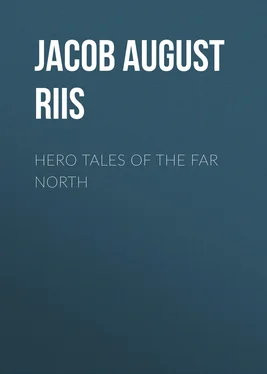Jacob August Riis - Hero Tales of the Far North
Здесь есть возможность читать онлайн «Jacob August Riis - Hero Tales of the Far North» — ознакомительный отрывок электронной книги совершенно бесплатно, а после прочтения отрывка купить полную версию. В некоторых случаях можно слушать аудио, скачать через торрент в формате fb2 и присутствует краткое содержание. Жанр: foreign_prose, История, foreign_edu, foreign_antique, на английском языке. Описание произведения, (предисловие) а так же отзывы посетителей доступны на портале библиотеки ЛибКат.
- Название:Hero Tales of the Far North
- Автор:
- Жанр:
- Год:неизвестен
- ISBN:нет данных
- Рейтинг книги:4 / 5. Голосов: 1
-
Избранное:Добавить в избранное
- Отзывы:
-
Ваша оценка:
- 80
- 1
- 2
- 3
- 4
- 5
Hero Tales of the Far North: краткое содержание, описание и аннотация
Предлагаем к чтению аннотацию, описание, краткое содержание или предисловие (зависит от того, что написал сам автор книги «Hero Tales of the Far North»). Если вы не нашли необходимую информацию о книге — напишите в комментариях, мы постараемся отыскать её.
Hero Tales of the Far North — читать онлайн ознакомительный отрывок
Ниже представлен текст книги, разбитый по страницам. Система сохранения места последней прочитанной страницы, позволяет с удобством читать онлайн бесплатно книгу «Hero Tales of the Far North», без необходимости каждый раз заново искать на чём Вы остановились. Поставьте закладку, и сможете в любой момент перейти на страницу, на которой закончили чтение.
Интервал:
Закладка:
His body lies in a black marble sarcophagus in the "Navy Church" at Copenhagen. The Danish and Norwegian peoples have never ceased to mourn their idol. He was a sailor with a sailor's faults. But he loved truth, honor, and courage in foe and friend alike. Like many seafaring men, he was deeply religious, with the unquestioning faith of a child. There is a letter in existence written by him to his father when the latter was on his death-bed that bears witness to this. He thanks him with filial affection for all his care, and says naïvely that he would rather have his prayers than fall heir to twenty thousand daler. His pictures show a stocky, broad-shouldered youth with frank blue eyes, full lips, and an eagle nose. His deep, sonorous voice used to be heard, in his midshipman days, above the whole congregation in the Navy Church. In after years it called louder still to Denmark's foes. When things were at their worst in storm or battle, he was wont to shout to his men, "Hi, now we are having a fine time!" and his battle-cry has passed into the language. By it, in desperate straits demanding stout hearts, one may know the Dane after his own heart, the real Dane, the world over. Among his own Tordenskjold is still and always will be "the Admiral of Norway's fleet."
HANS EGEDE, THE APOSTLE TO GREENLAND
When in the fall of 1909 the statement was flashed around the world that the North Pole had at last been reached, a name long unfamiliar ran from mouth to mouth with that of the man who claimed to be its discoverer. Dr. Cook was coming to Copenhagen, the daily despatches read, on the Danish Government steamer Hans Egede . A shipload of reporters kept an anxious lookout from the Skaw for the vessel so suddenly become famous, but few who through their telescopes made out the name at last upon the prow of the ship gave it another thought in the eager welcome to the man it brought back from the perils of the Farthest North. Yet the name of that vessel stood for something of more real account to humanity than the attainment of a goal that had been the mystery of the ages. No such welcome awaited the explorer Hans Egede, who a hundred and seventy-two years before sailed homeward over that very route, a broken, saddened man, and all he brought was the ashes of his best-beloved that they might rest in her native soil. No gold medal was struck for him; the people did not greet him with loud acclaim. The King and his court paid scant attention to him, and he was allowed to live his last days in poverty. Yet a greater honor is his than ever fell to a discoverer: the simple natives of Greenland long reckoned the time from his coming among them. To them he was in their ice-bound home what Father Damien was to the stricken lepers in the South seas, and Dr. Grenfell is to the fishermen of Labrador.
Hans Poulsen Egede, the apostle of Greenland, was a Norwegian of Danish descent. He was born in the Northlands, in the parish of Trondenäs, on January 31, 1686. His grandfather and his father before him had been clergymen in Denmark, the former in the town of West Egede, whence the name. Graduated in a single year from the University of Copenhagen, "at which," his teachers bore witness, "no one need wonder who knows the man," he became at twenty-two pastor of a parish up in the Lofoden Islands, where the fabled maëlstrom churns. Eleven years he preached to the poor fisherfolk on Sunday, and on week-days helped his parishioners rebuild the old church. When it was finished and the bishop came to consecrate it, he chided Egede because the altar was too fine; it must have cost more than they could afford.
"It did not cost anything," was his reply. "I made it myself."
No wonder his fame went far. When the church bell of Vaagen called, boats carrying Sunday-clad fishermen were seen making for the island from every point of the compass. Great crowds flocked to his church; great enough to arouse the jealousy of neighboring preachers who were not so popular, and they made it so unpleasant that his wife at last tired of it. They little dreamed that they were industriously paving the way for his greater work and for his undying fame.
The sea that surges against that rockbound coast ever called its people out in quest of adventure. Some who went nine hundred years ago found a land in the far Northwest barred by great icebergs; but once inside the barrier, they saw deep fjords like their own at home, to which the mountains sloped down, covered with a wealth of lovely flowers. On green meadows antlered deer were grazing, the salmon leaped in brawling brooks, and birds called for their mates in the barrens. Above it all towered snow-covered peaks. They saw only the summer day; they did not know how brief it was, and how long the winter night, and they called the country Greenland. They built their homes there, and other settlers came. They were hardy men, bred in a harsh climate, and they stayed. They built churches and had their priests and bishops, for Norway was Christian by that time. And they prospered after their fashion. They even paid Peter's Pence to Rome. There is a record that their contribution, being in kind, namely, walrus teeth, was sold in 1386 by the Pope's agent to a merchant in Flanders for twelve livres, fourteen sous. They kept up communication with their kin across the seas until the Black Death swept through the Old World in the Fourteenth Century; Norway, when it was gone, was like a vast tomb. Two-thirds of its people lay dead. Those who were left had enough to do at home; and Greenland was forgotten.
The seasons passed, and the savages, with whom the colonists had carried on a running feud, came out of the frozen North and overwhelmed them. Dim traditions that were whispered among the natives for centuries told of that last fight. It was the Ragnarok of the Northmen. Not one was left to tell the tale. Long years after, when fishing vessels landed on that desolate coast, they found a strange and hostile people in possession. No one had ever dared to settle there since.
This last Egede knew, but little more. He believed that there were still settlements on the inaccessible east coast of Greenland where descendants of the old Northmen lived, cut off from all the world, sunk into ignorance and godlessness,—men and women who had once known the true light,—and his heart yearned to go to their rescue. Waking and dreaming, he thought of nothing else. The lamp in his quiet study shone out over the sea at night when his people were long asleep. Their pastor was poring over old manuscripts and the logs of whalers that had touched upon Greenland. From Bergen he gathered the testimony of many sailors. None of them had ever seen traces of, or heard of, the old Northmen.
To his bishop went Egede with his burden. Ever it rang in his ears: "God has chosen you to bring them back to the light." The bishop listened and was interested. Yes, that was the land from which seafarers in a former king's time had brought home golden sand. There might be more. It couldn't be far from Cuba and Hispaniola, those golden coasts. If one were to go equipped for trading, no doubt a fine stroke of business might be done. Thus the Right Reverend Bishop Krog of Trondhjem, and Egede went home, disheartened.
At home his friends scouted him, said he was going mad to think of giving up his living on such a fool's chase. His wife implored him to stay, and with a heavy heart Egede was about to abandon his purpose when his jealous neighbor, whose parishioners had been going to hear Egede preach, stirred up such trouble that his wife was glad to go. She even urged him to, and he took her at her word. They moved to Bergen, and from that port they sailed on May 3, 1721, on the ship Haabet (the Hope), with another and smaller vessel as convoy, forty-six souls all told, bound for the unknown North. The Danish King had made Egede missionary to the Greenlanders on a salary of three hundred daler a year, the same amount which Egede himself contributed of his scant store toward the equipment. The bishop's plan had prevailed; the mission was to be carried by the expected commerce, and upon that was to be built a permanent colonization.
Читать дальшеИнтервал:
Закладка:
Похожие книги на «Hero Tales of the Far North»
Представляем Вашему вниманию похожие книги на «Hero Tales of the Far North» списком для выбора. Мы отобрали схожую по названию и смыслу литературу в надежде предоставить читателям больше вариантов отыскать новые, интересные, ещё непрочитанные произведения.
Обсуждение, отзывы о книге «Hero Tales of the Far North» и просто собственные мнения читателей. Оставьте ваши комментарии, напишите, что Вы думаете о произведении, его смысле или главных героях. Укажите что конкретно понравилось, а что нет, и почему Вы так считаете.












